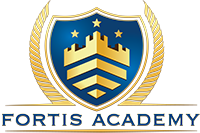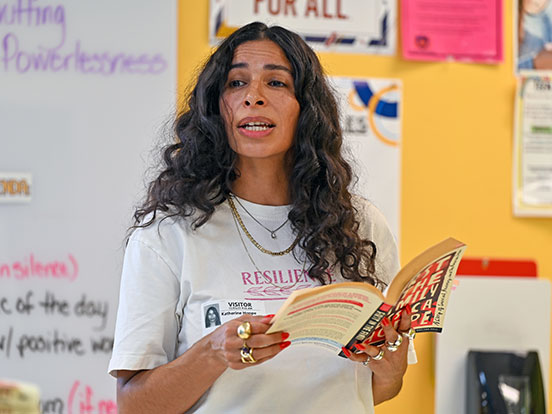Fortis Academy
-
 A hallmark feature of Fortis is its culinary arts program
A hallmark feature of Fortis is its culinary arts programAn overarching philosophy at Fortis is to move from a mentality of punishing students to helping them.
View our YouTube video playlist for more information. Fill out our contact information form and we'll be in touch!
"Peer pressure is a powerful force, so we combine counseling and coaching centers into the traditional school day to promote continued sobriety."
- HCDE Superintendent James Colbert Jr., avid supporter of Fortis Academy.
Frequently Asked Questions
-
What is unique about the recovery high school model?
Three components exist: coaching, counseling and academics. Recovery coaches are staff members who teens can relate to and who have experiences with adolescents. They are considered to be team mentors, cheerleaders, and advocates in recovery. Licensed counselors are available onsite to provide additional support. The school’s academic team helps students achieve the ultimate goal of receiving a diploma in a safe and sober environment. All students enrolled in the school are recovering from substance-use disorders.
-
Are there other public recovery schools throughout the nation?
40 recovery schools in the U.S. spread across 15 states (8 are in Texas; 2 are in the greater Houston area); most are private.
2 are operated under ISDs: McKinney ISD (Serenity High School) and Laredo ISD (Jose A. Valdez High School).
All recovery schools in Texas use a combination of private and public funds.
The recovery school in Texas most similar to HCDE’s proposed school is Serenity High School in McKinney ISD, which partners with other ISDs in the area to provide a recovery environment for students.
HCDE’s recovery school will be the first of its kind serving students in the Houston area and the third public recovery school in Texas, after Serenity and Valdez high schools.
-
Why are recovery schools critical for students who have received treatment for addiction?
The risk of relapse is higher when students must return to their pretreatment schools. One study found that nearly all adolescents returning to their old school were offered drugs on their first day back. For many adolescents, schools represent the environment of previous use and contact with using friends.
Researchers have concluded that post-treatment or continuing care is essential to recovery – especially for youth. While adolescents have many of the same issues as adults, they are statistically more susceptible to fatal injuries from motor-vehicle accidents, suicides, homicides, violence, delinquency, psychiatric disorders and risky sexual practices, as well as physical, sexual and emotional traumatization. Adolescents with a history of substance-use disorders are, not surprisingly, at an even greater risk.
-
How will students be selected for the recovery school?
HCDE will use the criteria of students stage of change, student treatment experience, and student interviews in selecting students. Districts may purchase seats through the interlocal process (similar to how they currently purchase seats at our Highpoint and AB Campuses). During its first year, the recovery school will offer 30 seats, with plans to grow to 60 seats and 90 seats in subsequent years.
-
How does the student gain enrollment into the school?
The student must be referred by the Harris County school district, so a parent or guardian would need to contact the student’s home district.
-
What about transportation?
For the first year, transportation will be handled on a case-by-case basis.
-
Does the student graduate from the recovery school or the home high school?
When a student gains the diploma, it is issued from the home school district. However, students may participate in either ceremony for graduation purposes, or both.
-
Which school calendar will HCDE follow?
HCDE gathers all participating school calendars and decides on a schedule which benefits the majority of the students. The calendar will ultimately be one devised by HCDE administration.
-
Will students be drug tested?
Yes, random drug tests will be conducted. Appropriate measurements of treatment enhancements will result from such testing.
-
Will the recovery school officials work in partnership with outside therapists?
Yes, the recovery school’s counseling team will work in harmony with the students’ therapists. Students and parents will have to sign a release form so that the school’s counseling team and outside therapists may communicate with each other regarding the student’s recovery status, progress, or other related concerns.
-
Will it be possible for students to graduate “on time” by attending the recovery high school?
Yes, it is possible for students to graduate on time while attending the recovery school by regaining any academic credits that may have been lost.
-
How long can students attend the recovery school?
Ideally, students will remain at the recovery school for the remainder of their high school years to receive a high quality education in a sober environment.
-
How are addiction issues addressed to encourage continued sobriety?
Individual, group sessions, and other case management services are provided daily. Counselors and / or recovery coaches will be available to provide case management services.
Referrals will be made for co-occurring disorders.
Counselors will be culturally responsive to their students by individualizing their counseling approach as necessary, avoiding assumptions based on cultural differences, identifying cultural issues that affect client recovery, and understanding differences in attitudes, beliefs, values, and communication styles.
Addressing case management needs (family, financial, transportation, educational, medical, etc.) can be done with a counselor or a recovery coach.
Schools Division Resources
-
2025–2026 Academic Calendar
Download the Academic and Behavior Schools East and West, Fortis Academy, and Highpoint East 2025–2026 Academic Calendar.
-
2025–2026 HCDE Special Schools Parent/Student Handbook and Code of Conduct
Each parent and student must review the 2025–2026 HCDE Special Schools Parent/Student Handbook and Code of Conduct.
-
Bacterial Meningitis Flyer
WHAT IS MENINGITIS?
Meningitis is an inflammation of the covering of the brain and spinal cord. It can be caused by viruses, parasites, fungi, and bacteria. Viral meningitis is most common and the least serious.
Meningitis caused by bacteria is the most likely form of the disease to cause serious, long-term complications. It is an uncommon disease but requires urgent treatment with antibiotics to prevent permanent damage or death.
Bacterial meningitis can be caused by multiple organisms. Two common types are Streptococcus pneumoniae, with over 80 serogroups that can cause illness, and Neisseria meningitidis, with five serogroups that most commonly cause meningitis.Check out the flyer for more information.
-
Bullying Complaint Form
This report must be completed to file a complaint relating to an incident of alleged bullying (for the purpose of
this form, bullying encompasses bullying, harassment, and discrimination).Once completed, this form should be returned to the school principal/designee of the school.
-
Curriculum, Compliance, and Course Connections Placement and Enrollment Guide
Please download and fully read the Curriculum, Compliance, and Course Connections Placement and Enrollment Guide
-
Learn About SPEDTex
The Special Education Information Center (SPEDTex) provides resources and interactive features for increasing family awareness of disabilities and special education processes, with the goal of improving partnerships between schools and families.
Contact information:
Phone: 1-855-773-3839
Email: inquire@spedtex.org
Live Chat: www.spedtex.org
-
Student Learning Objectives (SLO) Resources
Excellent teachers regularly set learning goals for their students and use a variety of data sources to monitor progress towards these goals throughout the year. The Student Learning Objectives process aims to capture this best practice as a means to allow teachers and teacher appraisers to determine and reflect on a teacher’s pedagogical strengths and areas for growth.
Student Learning Objectives are:
- Student growth goals set by teachers
- Focused on a foundational student skill that is developed throughout the curriculum
- Tailored to the context of individual students
- Designed to help teachers better understand the impact of their pedagogy
- For the purposes of refining instruction.
SLO Resources: https://texasslo.org/Resources
-
TEKS (An Online Curriculum Management System) Resource
What is TEKS Resource?
The Texas Curriculum Management Program Cooperative, or TCMPC, is a shared service agreement between the 20 Educational Service Centers (ESCs) in Texas. This shared service agreement, or SSA, allows participating ESCs to share responsibility for the management and operations of the online curriculum management system known as the TEKS Resource System.
The TCMPC provides content and support for an online curriculum management system known as the TEKS Resource System. The content includes curriculum components and sample unit assessment items aligned to the most current versions of the State Board of Education-adopted TEKS for the following subject areas:
- English Language Arts and Reading
- Spanish Language Arts and Reading
- Mathematics
- Science
- Social Studies
- Spanish translated versions of Mathematics, Science, and Social Studies
TEKS Resource - https://www.teksresourcesystem.net
-
Texas Teacher Evaluation and Support System (T-TESS) Resources
What is T-TESS?
T-TESS strives to capture the holistic nature of teaching – the idea that a constant feedback loop exists between teachers and students, and gauging the effectiveness of teachers requires a consistent focus on how students respond to their teacher’s instructional practices. For those reasons, each of the observable domains in T-TESS focuses on teachers and students rather than separating them out into separate domains. Ultimately, T-TESS is a process that seeks to develop habits of continuous improvement, and the process itself best leads to that outcome when appraisers and teachers focus on evidence-based feedback and professional development decisions based on that feedback through ongoing dialogue and collaboration.T-TESS includes three components:
- Goal-setting and professional development plan
- The evaluation cycle (including: pre-conference, observation, post-conference)
- Student growth measure
T-TESS Website: https://teachfortexas.org/
-
Texas Transition and Employment Guide
The Texas Transition and Employment Guide provides information on statewide services and programs that assist in the transition to life outside the public school system for students enrolled in special education programs and their parents.
Video Highlights
Contact Us
-
Principal: Travita Godfrey
11902 Spears-Gears Road
Houston, TX 77067
Phone: (713) 696-2195
Fax: (713) 696-2196
Hours of Operation: 7:40 a.m. to 3:10 p.m.
Upcoming Events
Latest News
-

‘Coach Kesha’ honored for two decades of sobriety and service to teens
Fortis Academy grad's story of transformation inspires students to believe change is possible
-

Nuestra Palabra connects Fortis students with acclaimed author
The Houston-based Latino literary group partnered with HCDE to host Jessica Hoppe, encouraging students to tell their stories and break stigmas around addiction

